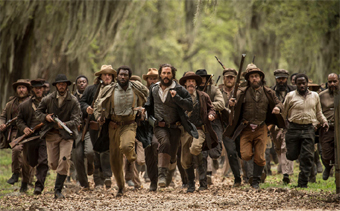
Courtesy Bluegrass Films/
Larger Than Life Productions
Free State of Jones
| published August 5, 2016 |
By Maggie Nichols, Thursday Review contributor
American history almost always makes for interesting grist for the Hollywood movie mill. And the grittier that history the better, as far as I am concerned.
Recent films based on the dark side of contemporary U.S. history—the ones which I would mark highly—include Black Mass, which tells the rather unpleasant and violent story of James “Whitey” Bulger, the Boston crime boss (played with eerie perfection by Johnny Depp), and Spotlight, which tells the complex and convoluted tale of a team of investigative reporters for the Boston Globe who attempt to dig deeply into accusations that some Catholic priests were serial child molesters often protected by the political power of the church (coincidentally also set in Boston).
But the U.S. Civil War makes for a trickier subject, and recent race relations in the United States—especially violence between cops and black citizens, and frequent violent altercations between white and black and Latino Americans—now present an almost daily thread of negativity seemingly disconnected from the larger American experience. Unless, those events are not disconnected. It gets complicated, and—as is always the case—it depends on one’s perspective.
The American Civil War pitted two economic systems and two sets of societal templates against one another, with the disdainful issue of slavery at the core of the debate between northern and southern states. Recent Civil War films, such as Glory and Cold Mountain, each dwell appropriately on the complex question of how to place value on life, the measure of one person’s life against another’s, and perhaps the common cinematic paradox: the futility of war versus the heroism of noble causes.
Free State of Jones, directed by Gary Ross and written by Ross and Leonard Hartman, approaches the Civil War from a different perspective altogether by taking on the incredible, strange but true story of Newt Knight’s (Matthew McConaughey) private counter-rebellion deep within the Deep South and far behind the lines of the Confederate States of America. Knight, a professional farmer and seasoned fighter for a brief period during the war, deserts the front lines to return to Mississippi. There, with help from like-minded farmers, ex-soldiers, runaway slaves, and an assortment of others, creates an ad hoc sanctuary, and prompting all of Jones County to effectively secede from the larger secession.
This unusual and audacious counter-rebellion requires some degree of military muscle, a large portion of political finesse, a few well-paced bribes, and larger-than-life cojones. Knight’s stand signals in part deep fractures already forming in the cohesiveness of the Confederacy: indeed, other “breakaway republics” were also springing up in North Carolina, Alabama, Tennessee, Georgia and Arkansas, in addition to large tracts of the Florida panhandle already popular with a variety of people fleeing the Confederacy and its growing lawlessness.
The real movie criticism worth noting here is that not only is the film excellent and worth watching—despite the sometimes grisly violence—but it may also be one of McConaughey’s best performances. Newt Knight, whose father and grandfather owned slaves, first feels his anger spark upon learning of something known as the Twenty Negro Law, an obscure statute which allowed any extended family of property to exclude from military service one of-age male for every 20 slaves in that family’s service. Newt found this both abhorrent and self-serving, not to mention so elitist as to be an outrage even by the carefully framed standards of the Confederacy.
Not happy to merely reject the Confederacy and form a mini-state, Newt took it one step further into even more dangerous territory by choosing to eventually fly the Union flag and declare his county aligned with the North—a treasonous act which could have led to the executions of every person associated with his insurrection. But Newt is, of nothing else, a natural leader of men and a charismatic sort who could inspire whole communities of farmers, planters, merchants, ex-slaves and ex-soldier.
But Newt also become, predictably, a controversial figure for southerners at the war’s conclusion, and—in fact—his legacy remains deeply contested in a few places even now, where his name is still considered a code for treason. The fact that the movie proceeds well past the end of military hostilities and into another era of social and economic war means that this film’s retelling of Knight’s unusual quest does not end when the cannons and rifles stop firing.
Several reviewers have pointed out that there is a little something here for everyone to hate: for one, practically every person in the film, white, black, Native American, rich or poor, young and old, healthy or frail, carries a weapon—real guns with lethal ordnance at the ready. Those squeamish about gun rights or flexible on the Second Amendment will squirm an awful lot. Plus, some economic conservatives will blanch at the next most obvious aspect of the story: social and economic injustice that was as cruel to poor whites as it was inhumane to black slaves, and a system “rigged” to support the largesse and the wealth of the richest people, while effectively trapping everyone else in a subservient market role.
Filmed mostly on location in Mississippi—much of in Jones County—and with sets and costuming as authentic as any Civil War film since Cold Mountain, the Free State of Jones benefits from what is surely a deeply authentic look and texture, a cinematic value worth noting if you can see this one on the big screen, as opposed to TV.
Thumbs-up on this powerful film about a larger-than-life figure from American history.
Related Thursday Review articles:
Bridge of Spies; R. Alan Clanton; Thursday Review; October 14, 2016.
In the Heart of the Sea; Maggie Nichols; Thursday Review; January 5, 2016.
